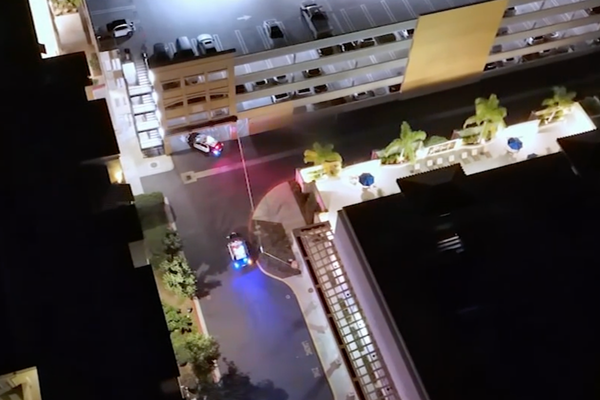An eco-tourism development between Noosa and Rainbow Beach could have flow-on consequences for environmentally protected land elsewhere in Queensland, a conservationist says.
The construction of semi-permanent cabins and communal structures at five sites along the 100-kilometre Cooloola Great Walk in the Great Sandy National Park was due to start this year.
The cabins would be situated between the environmentally-sensitive Fraser Island World Heritage Area and the Noosa Biosphere Reserve.
Rainbow Beach resident and lobby group member Greg Wood said the development would result in the privatisation of national parks across Queensland.
"If we open the gates [and] let that in, [and] they make it a high-priced exploitation product, there'll be damage to the park, there'll be exclusion of people who can't pay the access fee," Mr Wood said.
"We'll lose control over it because once a certain thing gets accepted as normal, they'll want to increase it another 20 per cent, that's just how business works."
The Department of Environment and Science (DES) website states that it can approve eco-tourism facilities in national parks providing the application meets criteria "consistent with the park's natural and cultural resources and values".
"The Implementation Framework for Ecotourism Facilities in National Parks and the Best Practice Ecotourism Development Guidelines underpins a rigorous assessment process," a departmental spokesperson said.
The state government opened expressions of interest to develop the Cooloola Great Walk Ecotourism project in 2018 and announced Australian company CABN as the preferred proponent in 2020.
The ABC has contacted CABN for comment.
On its website, CABN said the eco-camps would be low-impact, sustainable and in accordance with environmental assessments.
"Each site for the proposed off-grid, eco-friendly CABNs has been carefully considered and selected in partnership with [traditional owners] the Kabi Kabi and the Queensland departments … to minimise the accommodation's ecological footprint, respect cultural heritage, and allow visitors to enjoy an area of astounding natural beauty," according to the CABN website.
The Kabi Kabi First Nation Traditional Owners Claim Group have approved the eco-tourism development.
A Kabi Kabi spokesperson was contacted for comment.
A long way to go, MP says
In an outline of the project online, CABN stated that construction was "currently expected to commence in early 2022, for completion in late 2022 [or] early 2023".
However, no construction work has begun.
The state government would not confirm to the ABC when construction would begin.
But Independent state Noosa MP Sandy Bolton said she didn't expect the eco-tourism project to be up and running for at least two years.
"It's got still a long, long way to go. It's almost like the beginning of the end," Ms Bolton said.
"The process now is honing in on exactly what the environmental constraints are and everything that's been put in place to ensure good environmental outcomes.
"They will have to start developing what the actual pods [cabins] look like.
"The devil's in the detail, and for us now, our work is about what the actual management plans will look like."
She said while she normally wouldn't support commercial activities within national parks, the development was a great opportunity for local First Nations people, who would manage the sites.
"I fully appreciate it is so difficult when the cardinal principle around national parks is not to have commercial activity," she said.
"But I think what we've got to do is go, 'How do we get the best outcome here, in support of our First Nations people?'"
Residents 'horrified when they find out'
As part of the community consultation, in 2019 the Queensland government set up a website to receive public comment about the Cooloola Great Walk, which received 4,000 visits.
But three years on, Mr Wood said many residents and visitors did not know what was happening with the project.
Lobby group members recently spoke with motorists at the Tewantin ferry, at the most southern end of the walk.
"Out of 400 cars, we spoke to about three people [who] knew about it, which indicates the just complete lack of knowledge that people have of this … and of those, no one was in favour ," Mr Wood said.
"The problem is the secrecy of the whole thing, because so many people don't know.
"It's important people know because they [are] horrified when they find out and they [are] horrified that they weren't told."







